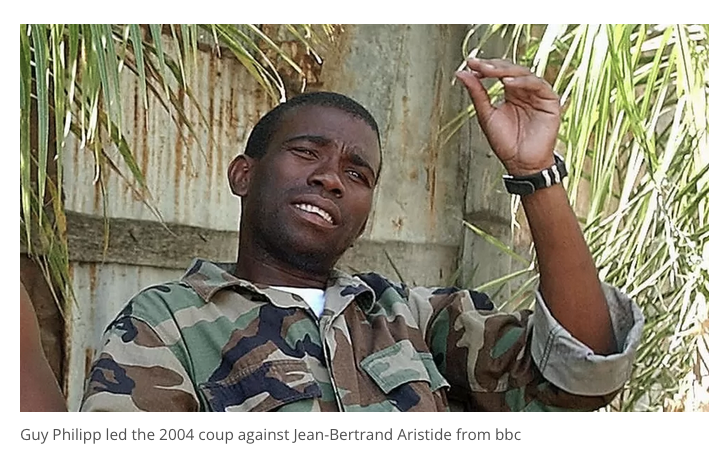Overview:
Guy Philippe, former rebel and convicted felon who has nourished the dream of becoming Haiti’s president, is excluded from participating in the Transitional Presidential Council. Based the adopted requirements, he’s being deemed ineligible. In response, Philippe has revolted and called on the population to “mobilize and impose their choice”.
PORT-AU-PRINCE — In a significant development in Haiti’s ongoing political crisis, Guy Philippe, a prominent political figure and former rebel and convict, has been deemed ineligible to be part of the seven-member presidential council. This council was established on March 11 through an agreement between the Caribbean Community (CARICOM) and Haitian political actors. The criteria for participation exclude anyone convicted or indicted by the justice system, those intending to participate in the upcoming elections, and those who do not accept the deployment of the multinational mission in support of security in Haiti.
Philippe, who has been advocating for the presidency, falls under the exclusion criteria due to his past conviction for conspiring to launder money derived from drug trafficking, in the United States. A US State Department official reminded VOA Kreyòl about Philippe’s case, stating, “Certainly, regarding participation in the presidential council, the criteria exclude individuals accused by the justice system or convicted of a crime.”
The criteria also present obstacles for other notable figures in Haiti’s political scene. These include former Minister Claude Joseph, accused in the assassination of former President Jovenel Moïse, and former Senator Jean Charles Moïse, who is likely to be a candidate in the country’s upcoming elections. Sanctioned individuals, such as former Senator Youri Latortue, accused by the international community of funding gang violence in Haiti, are also ineligible.
The Presidential Council
The establishment of the presidential council comes after at least five failed meetings between Caricom and Haitian actors. The council is set to replace Prime Minister Ariel Henry, who has been in power for 30 months without holding elections. The parties involved in this process have 48 hours from to submit the names of the personalities who will constitute the presidential council by the established criteria.
This progress towards finding a solution to Haiti’s political crisis comes at a time when gang violence is escalating, and criminals are demanding the departure of the Prime Minister, who is currently outside the country. Despite an apparent calm, the situation remains concerning in Haiti after criminals killed police officers, burned down police stations, and caused prison breaks in their armed attacks.
Philippe’s response
Philippe and several other Haitian political figures have spoken out against the proposal from Caricom and Haitian structures. In a video posted on social media, Philippe called on political parties to realize that Caricom’s decision does not reflect the will of the Haitian people. “The Haitian population, I urge you to mobilize because Caricom’s decision is not your decision,” says Guy Philippe. “Caricom has no legal authority to decide who will lead Haiti; it is up to the Haitian people to make that decision.”
Philippe’s political ambitions
Despite his ineligibility for the presidential council, Philippe confirmed his desire to become president of Haiti if the Haitian people want it during an interview with Reuters. He cited several examples of individuals like Nelson Mandela, Hugo Chavez, and Lula who, after being released from prison, became heads of state in their countries. “I’m getting into politics. I was a senator, I was elected by my people, I will run for elections again,” Philippe said. “So if my people believe in me and trust me, I will be their leader.”
However, with the new development accepted by Caricom on March 11, Philippe should effectively wait for the upcoming elections to be a candidate if the Provisional Electoral Council (CEP) gives the green light for a former convict to position as the next president of Haiti. This is a situation that the United States does not wish to see occur. “I believe it’s not only the United States but also several other countries in the international community that could consider it very concerning for a person convicted by the justice system of multiple crimes,” said the State Department official. “This will raise significant concerns for us,” he added.
Philippe’s influence
Since returning to the country after serving a prison sentence in the United States in November 2023, Philippe has gained significant prominence in the political scene through his idea of a peaceful revolution.
He has traveled to almost all major cities in the country to advocate for his position and demanded the resignation of Prime Minister Henry.
He has formed alliances with leaders such as Claude Joseph and Moïse Jean Charles who had previously organized several unsuccessful demonstrations to overthrow Henry’s government, criticizing his style of governance and his desire to remain in power.
Philippe, the gang leaders who have caused the recent escalation of violence in Haiti, and several other political structures warn that they do not recognize the transitional presidential council of Caricom. Some believe that the choice of a judge from the Supreme Court “Cour de Cassation” would be the best option, while others believe that it is up to the Haitian people to make their choice, not Caricom.
